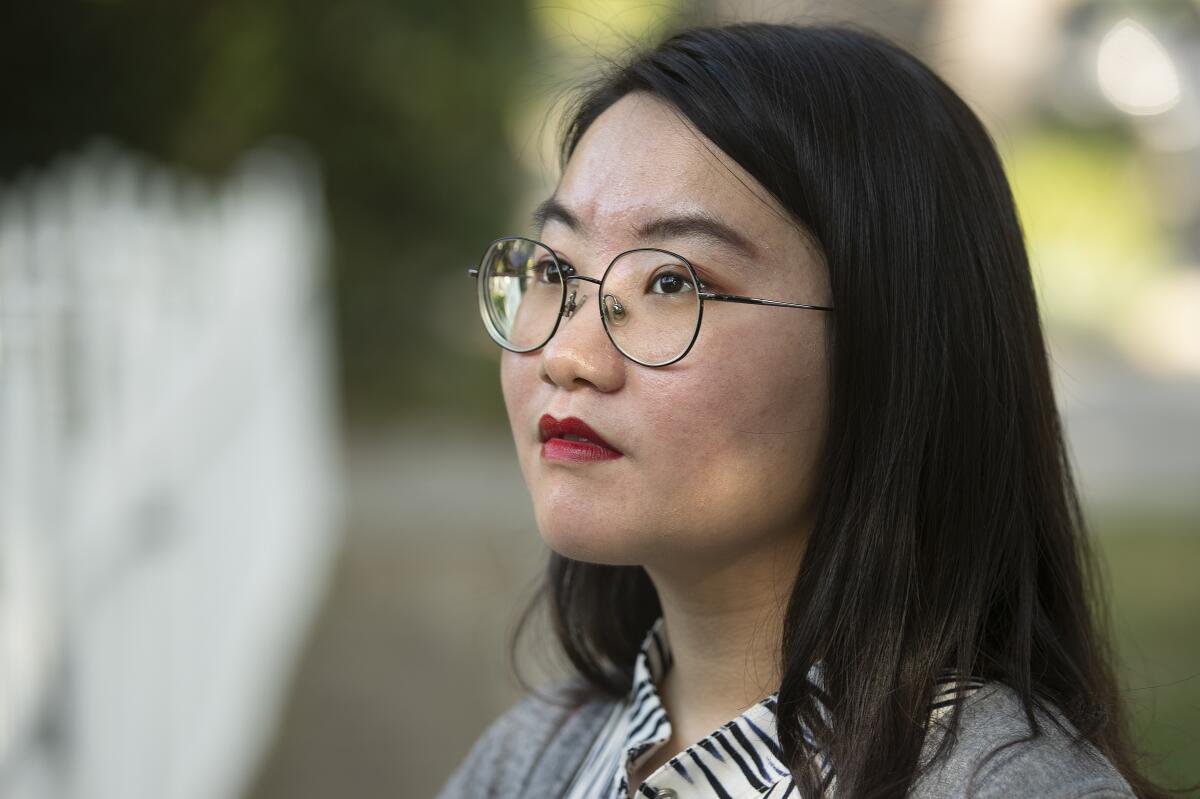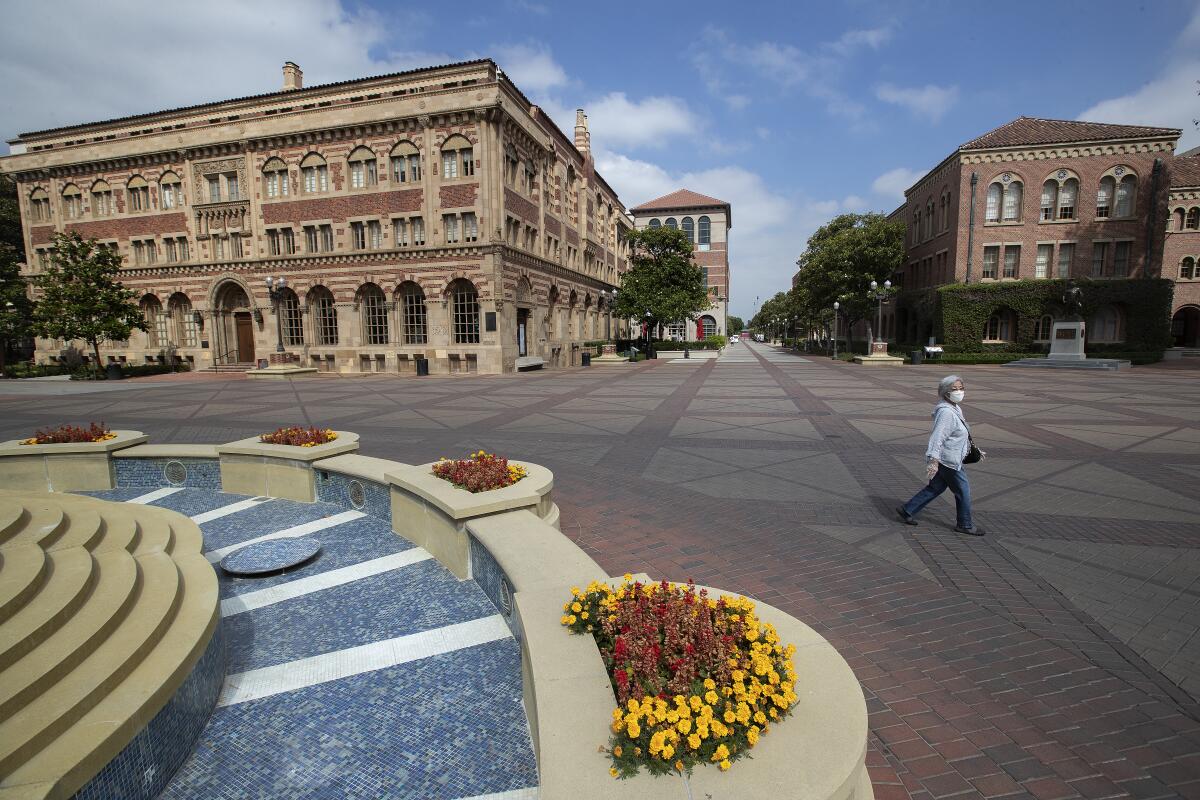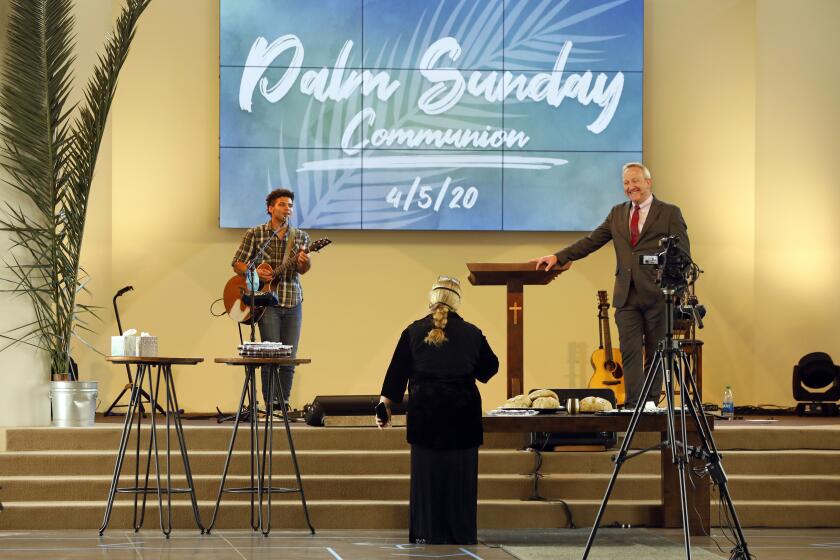I was a Chinese grad student and lost all of my money in a scam. How could it happen to me?

âHi, is that Xinlu Liang?â The caller, speaking in Chinese, woke me from a nap. âThis is a call from UPS. You have a suspicious package blocked at Chinese customsâ in Beijing.
The person on the other end of the line said he was checking the information on the mailing label. âIf you didnât send this package, then your personal information may have been leaked. We suggest you report this to the Chinese police.â
Iâd arrived in Los Angeles just 45 days earlier â at the end of June 2019 â to start work on a masterâs degree in journalism at USC, and every day was a struggle: seven hours of classes, Tuesday through Friday, followed by many more hours of writing.
I lived in an apartment near campus, with a roommate I didnât really know. I had few friends â and little familiarity with American customs. And I had, in fact, been waiting for word on a package sent via UPS with some documents related to my undergraduate education.
What if someone had stolen my information?
So, yes, I wanted to speak with the police. The caller said he would transfer me.
This is a highly confidential case ... To keep it secret call me âBrother Maâ instead of âCapt. Maâ from now on.
Someone who identified himself as Zhigang Xu, âa police officer in Beijing,â came on the line and agreed to file a report on my behalf, reminding me how important it is to protect my identity data. âMs. Liang, let me run your name in the database to see if your information has been used anywhere else,â he said and placed me on hold.
Minutes later, he came back on the line. âXinlu Liang! Why does your name pop up in the biggest money-laundering case in China?â he asked.
âI donât know what youâre talking about!â I responded.
At first, I was bewildered; then, I was terrified.
I was also hooked, desperate to clear my name.
Five days after that first call, I made the biggest mistake of my life: I walked to a nearby Bank of America branch and transferred all my money â $43,000, which I needed for tuition and room and board â to what I believed was an official bank account at an HSBC branch in Hong Kong. This, I was assured, would be only temporary, so authorities could pursue their investigations and declare my innocence.
At this point, youâve undoubtedly come to a conclusion that would take me another couple of days to reach: Iâd been scammed.
How could I be so gullible?

I subsequently discovered that my experience is not unique. According to the Institute of International Education, which helps administer study-abroad programs, the number of Chinese students in the U.S. has grown from 127,628 in 2009 to 369,548 in 2018, and those students â accustomed to Chinaâs authoritarian rule and susceptible to anyone who purports to be from the government â are particularly vulnerable. Some students are being fleeced (as I was) for tens of thousands of dollars.
Behind these thefts are criminal syndicates that run, according to one scammer, âa huge, well-organizedâ operation with multiple tiers of people working out of different countries. With their well-scripted tactics, they prey on studentsâ fears â frozen bank accounts, extradition to China, years in prison, and shame.
Even now, I still shudder when I think of how I allowed myself to fall for their scheme.
My parents had worked hard to attend university and establish themselves as English teachers in the city of Guangzhou, a metropolis in southern China. Throughout my childhood they emphasized the importance of education, and I was able to attend Sun Yat-sen University, a top school in China. All the while, they were scrimping and saving so I could eventually study abroad as a graduate student.
This one-year experience at USC was not only my dream, but theirs as well.
Which is part of the reason I felt compelled to listen to the âpolice officer in Beijingâ on that first call.
The gravity of my case demanded the attention of someone higher up, âOfficer Xuâ said, and he transferred me to âCapt. Ma,â who came straight to the point.
âHow do you explain how the criminals have a credit card in your name with RMB230,000 [charged] on it? You are a suspect! You must cooperate with the police!â (RMB, short for renminbi, is the official currency of China, and 230,000 is equivalent to about $33,200.)
âThis is a highly confidential case,â he continued, adding that when we spoke, I should make sure I was alone. âTo keep it secret,â he said, âcall me âBrother Maâ instead of âCapt. Maâ from now on.â
During the next few days, âBrother Maâ texted me a âwarrantâ from the âNational Confidentiality Bureau,â a list of victims of my âmoney-laundering case,â and âordersâ for my extradition to China and the freezing of my bank account.
Then he called to hammer home his point: It appeared that the funds in my Bank of America account and the credit card with my name on it were connected to that money-laundering scheme. Wiring those funds to a bank account specified by a âsenior prosecutorâ would allow officials to further investigate.
The âsenior prosecutorâ instructed me to transfer my money to an HSBC account that belonged to âChang Li-Yu,â who he said was an officer from the Independent Commission Against Corruption in Hong Kong, an organization that specializes in checking cross-border financial transactions.
I hung up, rushed to the bank and transferred the $43,000. I had less than $200 in cash on hand.
I was now broke, but, strangely, relieved. The matter would be cleared up soon, and I was confident my money would be returned.
Then I got a call demanding $50,000, which would serve as âbail money.â
I panicked and called my parents.
âMom, you know the tuition fee for the fall semester is due soon, but now thereâs a discount if we pay for the spring semester as well. Could you please give me another $50,000?â
My mother wasnât buying it.
âScreenshot the announcement and send it to us,â she said.
âActually, I lost my debit card yesterday and someone stole all the money in it,â I said, bursting into tears.
She was suspicious. âWhat happened, Lulu? Why canât you tell me?â
âWhy canât you just believe me! Itâs urgent and secret!â I screamed from the bathroom.
After I spoke with my parents, I called the âsenior prosecutor,â who bristled at me. âYouâre not cooperating with the police! ⌠Capt. Ma and I will also be punished!â Then he let out a long sigh, adding: âYou disappoint me.â
But something about his reaction didnât sound professional, and for the first time in this horrible odyssey, my confidence in the âofficialsâ started to waver.
I consulted a lawyer friend in China.
âItâs a scam!â she blurted out. âJust click online and youâll see how many cases like this happened four to five years ago.â
I tossed and turned all night. Panic shifted to anger and then hate, which smoldered inside me.
The next morning, I walked to USC Department of Public Safety to make a report. But the officer focused on the money transfer, and I didnât get the chance to explain in detail how I fell for the scam in the first place. There was no translator, so I was forced to fumble for words that werenât yet in my vocabulary.
(Later in the year, I spoke with DPS Community Affairs Manager Elizabeth CarreĂąo-Diaz, who said the department has subscribed to a âlanguage bankâ where translations for international students can be done via phone, but this option wasnât offered to me when I first reported that Iâd been scammed.)
The officer filed a report with the Los Angeles Police Department, which, he said, would take over my case. A few hours later he gave me a copy of the DPS investigative report, which consisted of two sentences: âSusp told vict, she was suspected of money laundering, and she needed to pay $43,000 to clear her name. Vict transferred money.â
(When I spoke with David Carlisle, assistant chief of the DPS, about this process, he said, âSome of our officers are not as skilled as others in how to conduct an investigation, so I apologize if that was not done well. What we typically do is talk to our detectives who have more investigative experience and alert them that weâre taking this type of report.â)
My next stop was my local Bank of America branch, where I explained that Iâd been scammed. The bank set up a case file, but I was told that the money was probably gone â forever.
Ryan Showell, a Bank of America executive client care advocate and fraud specialist, says itâs possible for the bank to flag suspect transactions. If something seems amiss, an employee can ask a client to confirm that they really want to make the transfer. But some scammers coach victims on their responses to bank employees, to say things like âmy family needs the money,â which is exactly what I said. And once the money is transferred, things can get sticky.
Bank of America spokeswoman Betty Riess said, in an email, âUnfortunately, it isnât always possible to get the money back once it is sent by the client because the receiving account often is already closed or fraudsters have already withdrawn the money from the account.â
::
I had come to the U.S. to study journalism, so I forced myself to shake free of my self-pity and get to work.
I pored over dozens of court verdicts obtained from China Judgments Online, an archive of legal cases, and learned about China-based criminal rings that impersonate law enforcement officials. Although they target victims in China, their tactics are much the same as those who prey on Chinese students overseas.
I read up on the growing number of international students who are scammed at U.S. colleges and universities, including USC. According to the universityâs Department of Public Safety, during the 2018 fall semester 17 students were defrauded in government-impersonation scams over the phone or via email. The average loss was $3,500; the largest amount was $75,000.
Officials acknowledge they canât know exactly how many people are ensnared in these schemes. âMany times, I think the students donât report them to us,â Carlisle said. âSometimes theyâre embarrassed. Sometimes they upset their family, so there could be at least a few cases that are never reported to us.â
If a student wants help, the process may seem labyrinthine.
When my parents got in touch with police in Guangzhou, they were told that I had to ask Los Angeles law enforcement for help. A friend who lives in Hong Kong tried to get some assistance from police there and got the same response: Ask the LAPD. But the detective who handled my case said if the money had been transferred to a bank in Hong Kong and the criminals were not in the U.S., the investigation was beyond their jurisdiction.
In early January, when I was home for winter break, I visited the HSBC bank branch in central Hong Kong where Iâd sent all my money. A customer service officer at HSBC said officials could not â and would not â tell me anything about a person who withdrew money from an account unless the Hong Kong police required it.
::
Every August, before the start of the fall semester, USC holds an orientation for new students, which includes information about campus life, classes â and warnings about scams. But Iâd been in school since June, overwhelmed with work, and was unable to attend.

When I interviewed university officials about what happened to me, they all emphasized USCâs commitment to creating awareness about scams.
Eddie North-Hager, USCâs executive director of media relations and research communications, said in an email that the university âis deeply committed to student security and well-being,â adding: âWe were sorry to hear about [this] case, which highlights the importance of our communications with international students, one of many groups targeted by scammers.
âEach semester, we send several emails with scam notices and prevention tips as well as publish updates online about scams at https://dps.usc.edu/be-aware-of-scams/ and https://ois.usc.edu/living-in-la/safety/.â
CarreĂąo-Diaz says the DPS holds a monthly meeting with representatives from different international student associations, including the Chinese Students and Scholars Assn., or CSSA. Scams are sometimes a topic of discussion.
I never attended any of those monthly meetings, but in November, when I attended a âBoba nightâ co-hosted by the CSSA and the DPS to alert Chinese students about safety issues, the conversation about scams seemed a little lighthearted and didnât take long; many of the students chuckled and looked at one another in disbelief.
::
In the days after I realized I had been duped, I fell into a deep abyss. My family had to come up with another $43,000 to get me through school. I felt so guilty that I refused to spend $2 to dry my clothes, hanging my laundry out to dry instead. I stayed in bed for hours, binge-watching Korean TV shows.
Eventually, I started to joke about my nightmare with American friends. I thought Iâd weathered the crisis, but I hadnât, and I sought counseling.
When Sarah Schreiber, a counselor at USC Engemann Student Health Center, pushed me to look back at the fraud, I had to fight back tears.
Schreiber told me that emotional support for the victims is important after they report the case to the police. âItâs not your fault,â she said to me. âDonât blame yourself.â
I talked to my parents, and my mother reminded me of a dream Iâd shared with her after the scam.
âYou said you dreamed of the fake police banging at your door and trying to take you away,â she said. âYouâre scared to death but canât wake up. No one is by your side. Youâre all alone in an empty room, haunted by their voices and the everlasting bang, bang, bangâŚ.â
The scars will be slow to heal.
More to Read
Sign up for Essential California
The most important California stories and recommendations in your inbox every morning.
You may occasionally receive promotional content from the Los Angeles Times.








